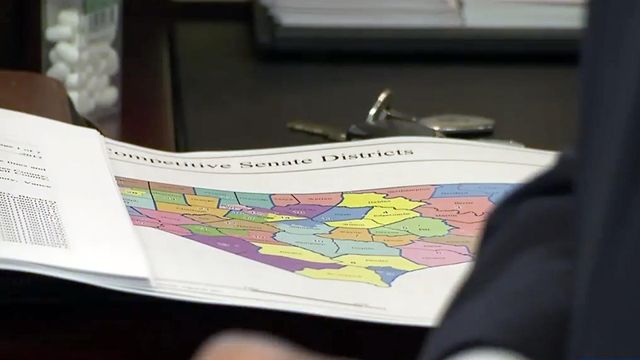NC House, Senate move on new voting maps
North Carolina's new General Assembly maps continued their way through the legislature Friday, with the Republican majority pushing their proposals through a key House committee and the full Senate on near-party-line votes.
Posted — UpdatedThe Senate gave preliminary approval to its map, with a final vote set for Monday. A pair of Republicans sided with Democrats against the map: Sen. Deanna Ballard, R-Watauga, who would have to run against another Republican to keep her seat, and Sen. Rick Horner, R-Wilson, who complained that the computerized map-making process failed to keep rural community interests close to heart.
The House map cleared committee 25-16, with state Rep. Michael Speciale, R-Craven, the only Republican voting against it.
Multiple votes remain before either the House or the Senate map can be finalized because each chamber must also approve the other chamber's map. Then, it will be up to three federal judges who found 28 districts in the current maps were unconstitutional racial gerrymanders to decide whether the General Assembly fixed the problem.
The Republican majority has redrawn those maps without, leaders have said, looking at racial data at all. Democrats responded with incredulity: How do you fix a racial gerrymander, they have asked over and over again, without paying any attention to race? And how, they have asked, do you convince the court you've fixed it?
"It just is anti-intuitive that you could fix a problem without addressing the problem," Senate Minority Leader Dan Blue said Thursday, suggesting Republicans haven't taken the court's orders seriously.
"We have place a lot of respect into what the court says," Sen. Ralph Hise, R-Mitchell, responded. "We have answered the court's questions with these maps."
Jackson, D-Wake, argued that substituting voting patterns for race in drawing district lines didn't change the gerrymandering, noting some of the districts in the new House map are almost identical to those the federal courts questioned.
Rep. Nelson Dollar, R-Wake, said the alternative map requires "political and gratuitous" double-bunking of numerous lawmakers, forcing them to run against one another to retain their seats.
"This was drawn for purely political and partisan reasons," Dollar said.
Jackson responded that the criteria lawmakers set several weeks ago to draw new maps, which included protecting as many incumbent seats as possible, were never prioritized. So, the people who crafted the alternative map may have put more emphasis on making districts as compact as possible than on keeping incumbent lawmakers in separate districts.
Rep. David Lewis, R-Harnett, also suggested the only motive for the plaintiffs' map was to elect as many Democrats as possible.
"These pesky people in the rural areas won't vote for Democrats, so we need to change the maps," Lewis said sarcastically.
Related Topics
• Credits
Copyright 2024 by Capitol Broadcasting Company. All rights reserved. This material may not be published, broadcast, rewritten or redistributed.






